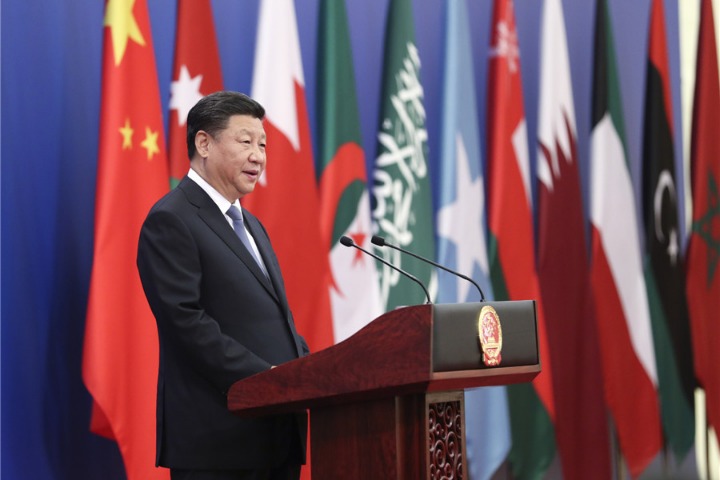President Xi Jinping delivers a speech at the opening ceremony of the eighth ministerial meeting of the China-Arab Cooperation Forum in Beijing on July 10, 2018. [Photo/Xinhua]
Editor’s note: China Daily publishes a series of articles reviewing President Xi Jinping’s visits to China and abroad over the past decade to present his vision for development in China and the world.
Shaojin Chai recalled the buzz surrounding preparations for a series of welcome events to the United Arab Emirates ahead of President Xi Jinping’s visit to the country in 2018.
Chai, an assistant professor in the department of international relations at the University of Sharjah in the United Arab Emirates, had been invited by some Emirati cultural and press institutions to participate in their events, including a cultural event that Xi’s wife would attend, Peng Liyuan. .
“Everyone was excited,” Chai said. “It was the first time since (1989) that a (Chinese) head of state visited the United Arab Emirates,” he said, referring to President Yang Shangkun’s December 1989 visit. The visit was reciprocated in 1990 when the late founding father of the United Arab Emirates, Sheikh Zayed Bin Sultan Al Nahyan, visited China, six years after the establishment of diplomatic relations between the two countries in November 1984.
Relations between China and the UAE have been greatly boosted since Xi’s visit, analysts said.
The visit of the leader of a major power to the UAE “is important for the UAE, both strategically and symbolically,” Chai said.
Du Wei, Chinese director of the Confucius Institute at Zayed University, said Xi’s visit boosted education collaboration between China and the UAE, especially since the government of the United Arab Emirates was preparing to launch a Chinese language program in 100 public schools.
Xi’s visit “promoted, facilitated and also formalized” the launch of the Chinese-language program, Du said.
“Traditionally, people here think the Chinese language is hard to learn,” said Du, who regretted missing Xi’s visit because she was accompanying Emirati students on a visit to China at the time. 20-day study in China.
“Since (Xi’s) visit, people feel the need to study the language. They are more interested in understanding China.”
Du said she was part of the team of specialists that produced an initial study on the introduction of Chinese-language curricula in collaboration with the UAE Ministry of Education. She selected and interviewed 20 teachers to launch the program, she said. It grew rapidly and is now available in 141 public schools.
During Xi’s visit, China and the UAE signed several agreements, covering energy, finance, agriculture and e-commerce, including approving the establishment of the first service company Chinese state-owned financiers in Abu Dhabi.
Joint opportunities
Abu Dhabi National Oil Co and China National Petroleum Corp also agreed to explore joint business opportunities at this time.
Today, as the two countries also grapple with the COVID-19 pandemic, the UAE Embassy in Beijing said the annual value of bilateral trade between China and the UAE has reached 50 billion. billion and was on track to increase to $200 billion by 2030.
“In fact, let’s say what we saw afterwards proved that the visit was a basis for trust and cooperation that followed, and was very important for this partnership, especially on science,” Rasha Al said. Joundy, Gulf expert and senior. researcher at the Dubai Center for Public Policy Research.
“China and the UAE have been cooperating intensely to fight the COVID-19 pandemic. In fact, the UAE hosted Sinopharm’s clinical trials and they manufactured Sinopharm (vaccines). … The UAE had the highest vaccination rate because of it.”
In December 2020, the United Arab Emirates was the first country to approve emergency public use of COVID-19 vaccines developed by Sinopharm. In March last year, the United Arab Emirates announced that it would start manufacturing these vaccines locally as part of a joint venture between the Chinese pharmaceutical company and an Abu Dhabi firm.
The collaboration between China and the United Arab Emirates has facilitated a vaccination program for low-income countries, particularly in Africa, proving that bilateral relations have not been affected during the pandemic and that trade in other sectors also continued, Al Joundy said.
“There has been no shortage of products from China in the UAE during the pandemic,” she said, adding that the increased mutual trust generated during Xi’s visit has become crucial, given the issue. food security today.
Ebrahim Hashem, former adviser to the chairman of the Abu Dhabi Executive Office, an authority responsible for Abu Dhabi’s long-term strategies, and Asia Global Fellow at the Asia Global Institute at the University of Hong Kong, said that Xi’s “crucially important” visit in 2018 helped to transform the UAE-China relationship from a “strategic partnership to a comprehensive strategic partnership”.
Knowledge of China, its civilization and culture has improved significantly since Xi’s visit, Hashem said. Before the visit, everyone “was talking about the West and I was talking about China”, he said.
“But after this visit, a major paradigm shift occurred in the minds of many Emiratis. In my opinion, there is almost no limit to the potential of this relationship,” Hashem said.
“Oil (the sector’s contribution to) GDP is less than 30%. Non-oil (the contribution to GDP) is over 70%, but we have our long-term view, and we see major synergies between our long-term vision and the Belt and Road Initiative, he added.
Higher contribution
In April, the UAE’s Federal Center for Competitiveness and Statistics said the non-oil sector’s contribution to the country’s GDP stood at 72.3% last year, down from 71.3% in 2020.
Hotels and restaurants contributed 21.3%, wholesale and retail trade 14.1% and the health and social services sector 13.8%.
“We want a bigger contribution from manufacturing to our GDP,” Hashem said. “We are interested in technology. There is now a huge collaboration between us and China in the field of technology (and) the digital economy.
“Renewable energy is another area, (as well as) digital technology, the digital economy and, of course, security. makes it take a while to develop and evolve.”

